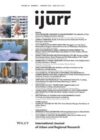This article starts by dealing with the methodological problems involved in analysing the state in post‐socialism and proposes a solution that is subsequently employed in the analysis. It then describes the transformation of the state in the Czech Republic after the fall of Communism in 1989. It investigates the role of the state in the mutual constitution of the state project and the dynamic of capitalist accumulation. It proposes a periodization of dominant state projects and dominant accumulation strategies with respect to their functional adequacy in relation to socio‐economic reproduction. I argue that, in the late 1990s, the Czech Republic experienced a crisis of a specific post‐socialist state regime, or, as I call it, ‘the Klausian welfare national state’. This regime co‐constituted a specific growth dynamic called Czech capitalism, which, however, failed to reproduce itself. A state form that is emerging from the search for an alternative is described as the ‘Porterian workfare postnational regime’ (PWPR). This development marks a moment of convergence in the Visegrad‐Four region. After a period of distinctive national projects, we are witnessing a relative convergence towards the PWPR. RÉSUMÉ: Cet article commence par les problèmes de méthodologie que pose l’analyse de l’Etat postsocialiste, avant de proposer une solution elle‐même appliquée à l’analyse qui suit. Il décrit ensuite la transformation de l’Etat, en République tchèque, après la chute du communisme en 1989. Ce faisant, il examine le rôle de l’Etat dans l’élaboration commune du projet étatique et dans la dynamique d’accumulation capitaliste. Une périodisation des projets étatiques dominants et des principales stratégies d’accumulation est proposée en fonction de leur pertinence fonctionnelle par rapport à la reproduction socioéconomique. Vers la fin des années 1990, la République tchèque a subi une crise spécifique à un régime d’Etat postsocialiste que j’appelle ‘l’Etat national klausien de protection sociale’. Ce système a bâti conjointement une dynamique de croissance particulière, le capitalisme tchèque, qui n’a toutefois pas assuré sa reproduction. De la recherche d’alternatives, émerge une forme d’Etat désignée comme le ‘régime postnational porterien d’allocation conditionnelle’ (PWPR, Porterian Workfare Postnational Regime). Cette évolution marque une convergence dans la région des quatre pays de Visegrad: passée une période de projets nationaux distincts, on assiste à un relatif rapprochement dans le sens du PWPR.
Details
Written by:
JAN DRAHOKOUPIL
Digital Object Identifier (DOI)
10.1111/j.1468-2427.2007.00727.x
About DOI
Read full article as PDF
Read full article as HTML
See the references for this article
